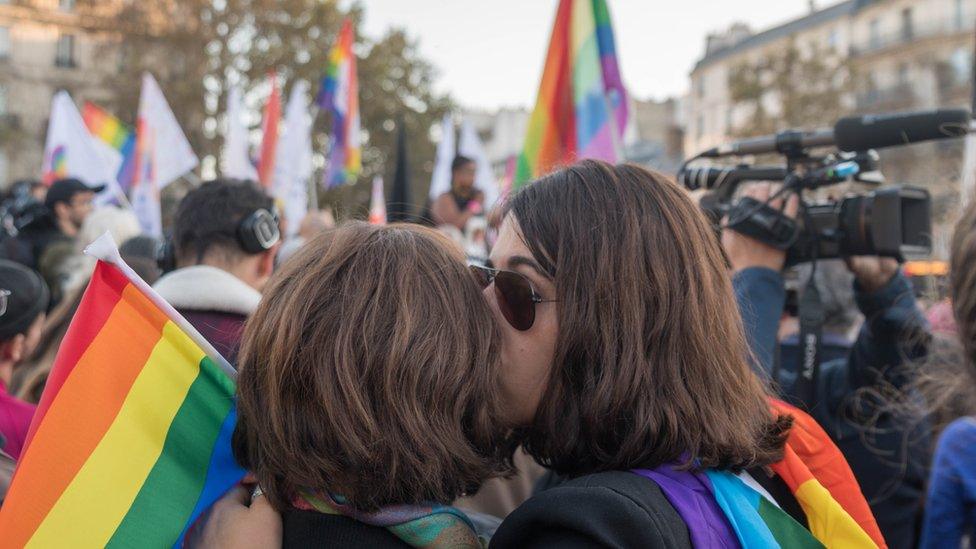LGBT harassment: 'Colleagues say they'll fix me'
- Published

A survey released on International Day Against Homophobia, Biphobia and Transphobia revealed harassment of LGBT people at work
After research suggested that more than two-thirds of LGBT people in the UK have been sexually harassed at work, some of those affected contacted BBC News.
The report by the Trades Union Congress revealed that 42% of people polled had received unwanted comments from colleagues about their sex life.
Meanwhile, 27% had received unwelcome sexual advances.
Here, two people describe their experiences of harassment, bullying and inappropriate treatment at work.
'I thought lesbians had to be butch'
Sarah (not her real name), 26, is a nurse and says her harassment began when she was a trainee.
"My mentor was very religious and didn't accept homosexuality. She asked if I had a boyfriend. I told her about my girlfriend, but she wouldn't accept it. She only ever referred to her as 'my friend'," Sarah told BBC News.
Another mentor asked if she wanted to start a family, but "looked angry and uncomfortable" when Sarah explained how she and her girlfriend planned to have children together.

The survey revealed that 66% of those harassed did not tell their employer
Sarah says it was difficult to challenge their comments because they were responsible for grading her.
Since she qualified, she says colleagues frequently make comments or ask inappropriate questions:
"One laughed in my face when she saw me ordering dresses, saying she didn't think lesbians wore feminine clothes. Then she asked to see a picture of my girlfriend and commented, 'I thought one of you had to be butch?'"
When Sarah asked why she was laughing, the woman replied, "I just find this whole thing hilarious."
Male colleagues have asked if they can watch Sarah and her girlfriend having sex, and she says it's common for others to ask very intimate questions about her sex life.
Sarah believes that, most of the time, the behaviour comes from ignorance, rather than malice, but she says it makes work more complicated and she often feels excluded.
'No place I feel comfortable'
JT says that harassment in the workplace is something she has had to get used to.
"I've been told by men I work with, as well as customers, that they can 'fix' me and make me 'normal'. Some have tried to force themselves onto me in an attempt to do that," she explained.
Intrusive and inappropriate questions are also commonplace.
"Once I had to spend my entire shift talking with a colleague about my gender. She said clearly I just wanted to be 'special' and none of it was real. She then had her mother come in and ask me loads of questions too - about my genitals, what I do with sex, relationships, if I had been abused before."
Colleagues have commented that JT's girlfriend was "too pretty" for her, and instead she should expect only to date a "weird little butch".
JT says it makes it hard to have pride or self-confidence because there are constant reminders that people "see me as something they can change or someone they can leer at".
"If you don't say anything it encourages the behaviour and makes me uncomfortable constantly. If I do complain, I'm told I'm just overreacting or I'm making people uncomfortable.
"There's no place that I can just feel comfortable," she explained.
As told to Georgina Rannard